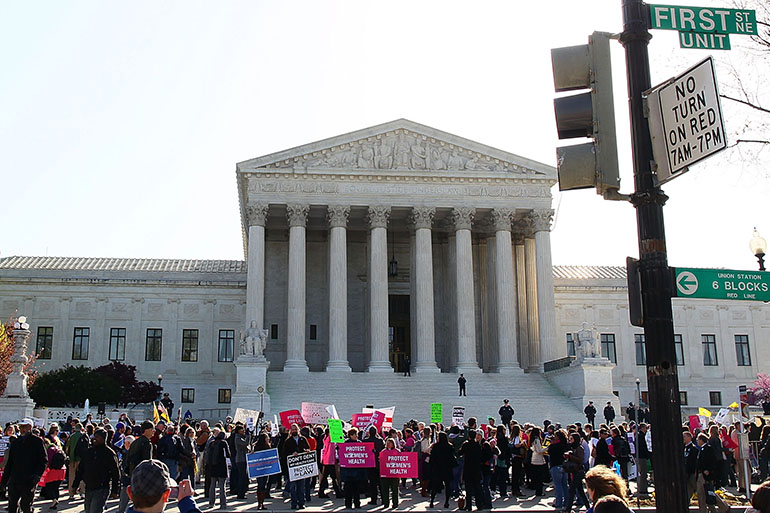The U.S. Supreme Court’s ruling in a case challenging mandatory union dues in California will deal only with government employees and probably won’t have an immediate impact on health care either nationally or in California.
But if the court removes the requirement for public employees to pay “fair share service fees,” which are tantamount to membership dues, the long-term ramifications could significantly change the health care delivery system, experts predicted.
In Friedrichs v. California Teachers Association, 10 California teachers argue that forcing employees to pay dues to a union they don’t support violates the First Amendment. Under state law in California and 20 other states, public employees who opt not to join an established union must pay a “fair share service fee,” meant to pay for collective bargaining and lobbying.
Judging by questions and comments from justices during oral arguments last week, many labor and legal experts predict the court’s conservative majority may rule against mandatory union fees.
A decision is expected by June.
Advocates for Reform, Access to Coverage
Labor unions in California have been strong advocates for health care reform, for expanded access to coverage and for greater investment in public health.
Any weakening of union clout — a predictable result of a ruling against mandatory dues, most labor experts agree — would change the way policies are debated and decided.
“Overall, labor played a big role in California in both working for and promoting health reform,” said Ken Jacobs, chair of the Center for Labor Research and Education at UC-Berkeley.
“Labor serves as the main counterbalance to corporate power and in the California public sector workers make up almost half the union membership,” Jacobs said. “So far, the decline in unions has been mostly in the private sector. If the court rules against unions in this case, it will have a real impact that will be felt in a lot of areas in the state, including health care,” Jacobs said.
Joanne Spetz, director of the UC-San Francisco Health Workforce Research Center, agrees.
“It could have pretty broad-reaching ramifications in health care which has been an area with strong union activity in California for years,” Spetz said.
“Unions in general have been strong advocates for broad access to coverage, more investments in public health and more attention to health education programs,” Spetz said.
In addition to unions representing health care workers, unions representing all kinds of workers are strong advocates for health benefits for their members, Spetz pointed out. That kind of advocacy might be affected by the Supreme Court ruling.
“For many unions, health care benefits are a big part of negotiations along with policies to protect workers. If unions are weakened, that will affect those negotiations and eventually the kind of coverage and policies that come out of negotiations,” Spetz said.
Unions Worried
Officials at two of the largest, most influential health care unions in California are worried.
“This case is an attack on nurses’ ability to advocate for their patients without fear of employer retaliation,” said Zach Goldman, spokesperson for the California Nurses Association.
“At a time when the health care industry is prioritizing cost cutting over patient safety, nurses depend on the protection of the union to speak out against unsafe staffing, stand up for patient safety, and advocate for funding for safety-net hospitals.”
More than 450,000 nurses are licensed to work in California, according to UCSF statistics. At least 10,000 union members work at public hospitals which include University of California hospitals and county, district and state hospitals. They would be most immediately affected by the ruling
The Service Employees International Union has about 700,000 members in California, about 150,000 of them in the statewide United Healthcare Workers West. SEIU workers as well as nurses protested at the Supreme Court last week during oral arguments in the case.
“This case threatens the fundamental promise of America: that everyone should be able to succeed,” SEIU President Mary Kay Henry said in a blog on the SEIU website.
SEIU officials did not respond to questions for this story.
Jacobs said union influence in California’s health care system is pervasive and would be missed if it were to disappear or diminish.
“There are a lot of examples I can think of right off,” Jacobs said. “Last year, when the state was looking at a huge backlog of Medi-Cal applications, the SEIU played a big part in helping the state gear up to clear that backlog. Without a strong union, that might not have happened,” Jacobs said.
‘Free-Rider Problem’
If mandatory dues are determined unconstitutional in public sector unions, they could be challenged and overturned in private sector unions as well.
“Unions will continue to exist and continue to operate but they will have a free-rider problem with people who benefit from the union but choose not to contribute toward it,” Jacobs said.
“On some levels, this could be the next chapter in what has been a 40-year story about the erosion of unions in our economy,” Spetz said. “Public sector unions have been some of the only ones to remain strong and even grow, in some cases.
“But this may be a case of even those public sector union strengths eroding,” Spetz said.


